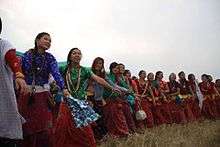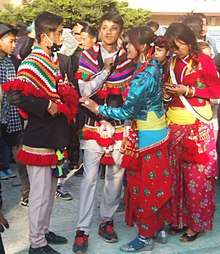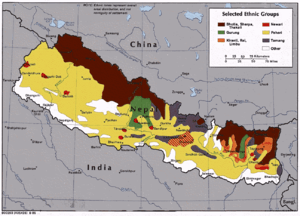Sunuwar people
The Sunuwar (Nepali: मुलबासी, कोइँच, सुनुवार; Sunuwār Jāti) are an indigenous tribe originating in Nepal. They speak the Sunuwar language. According to the 2001 census of Nepal, 17% of the tribe follow the Kirant religion and adopt the Mundhum (Kiranti) culture.[1]
 Kirati Sunuwar | |
| Total population | |
|---|---|
| Approximately 100,000 (2012 estimate) | |
| Regions with significant populations | |
| Languages | |
| Sunuwar, Nepali | |
| Religion | |
| Predominantly Kiranti, Buddhism
|
The Kiranti-Kõinchs number 55,752. The term ‘Kõinchs’ is also the name of the mother tongue. Other terms like Mukhiya or Mukhia are exonyms of the tribe. Sunuwar have their distinct language, religion, culture and social customs.[2]
They inhabit the eastern hills of Nepal and Himalayan. They are concentrated along the Molung Khola, Likhu Khola and Khimti Khola (‘Khola’ Indo-Aryan Nepali etymon ‘rivulet’) regions. By administrative division, they dwell in Okhaldhunga, Ramechhap and Dolakha districts of Nepal, politically known as Wallo (‘Near/Hither’), Kirant (in the past and also in use among the Kirantis at present) after the fall of the Kirant dynasty (ruling for about 1903 years and 8 months) at the ancient Nepal valley. Wallo Kirant in the past was their Kipat or communal land.
Lifestyle
Most Sunuwar practice agriculture (approximately 55%). They do so throughout the eastern hills of present-day Nepal and India. Crop cultivation and cattle farming (rice, millet, wheat, soybean, potato, and corn) are the main agricultural works. Sunuwar people also took part in the Second World War and were known as Gorkhali fighters, as well as honest. Some Sunuwar still join the Nepal Army, Indian Army, Singapore Police Force and British Army.
Traditional cultures

Sunuwar are very rich in culture and traditions. They have hundreds of traditional feasts and festivals with complex rituals and rules. Every traditional feast or festival has its own objectives, characteristics, and system of celebration. Some festivals, such as Chandi Dance in Baisakh Purnima, Sakela (Shyadar-Pidar), Gil puja (Gil-Pidar), and Meserani puja (Meserani-Pidar), are considered more important than others. They celebrate the Shyadar-pidar festival on the Day of Buddha Purnima, or after 5 days of Buddha Purnima(Panchami) according to the Nepali calendar. Sunuwar New year is celebrated on the day of Basanta Panchami. As a community, they celebrate Meserani Pidar twice a year, based on the Lunar Calendar.
Sunuwar Song (Koich Kumsho)
Sunuwari Song:
Reuhita Ragimshumshaa
(Raining)
Kirant Kings
The 29 Kirat kings were as follows:
- Yalamber
- Pavi
- Skandhar
- Balamba
- Hriti
- Humati
- Jitedasti
- Galinja
- Pushka
- Suyarma
- Papa
- Bunka
- Swananda
- Sthunko
- Jinghri
- Nane
- Luka
- Thor
- Thoko
- Verma
- Guja
- Pushkar
- Keshu
- Suja
- Sansa
- Gunam
- Khimbu
- Patuka
- Gasti
Gallery
 Udhuali
Udhuali Sunuwar girl
Sunuwar girl Sunuwar culture
Sunuwar culture Sunuwar Udhuali Sadhar
Sunuwar Udhuali Sadhar Sunuwar male and female
Sunuwar male and female Sunuwar Koich Puki at Tudikhel
Sunuwar Koich Puki at Tudikhel Sunuwar Koich Puki at Nakhipot
Sunuwar Koich Puki at Nakhipot
References
[3] [4] [5] [6] [7] [8] [9] [10]
- "Archived copy" (PDF). Archived from the original (PDF) on 2011-05-19. Retrieved 2011-04-02.CS1 maint: archived copy as title (link)
- A Grammar of Sunwar. Dörte Borchers. 2008. ISBN 978-9004167094. Retrieved 27 August 2018.
- "Central Bureau of Statistics". Cbs.gov.np. Retrieved 2017-07-01.
- "Sunuwar.org". Sunuwar.org. Retrieved 2017-07-01.
- Archived 2013-09-22 at the Wayback Machine
- "Sunuwar Samaj Hong Kong". Sunuwarsamajhk.org. 2011-09-23. Retrieved 2017-07-01.
- Archived 2013-09-25 at the Wayback Machine
- Archived 2013-09-08 at the Wayback Machine
- "Sunuwar Dress - Home". Facebook. Retrieved 2017-07-01.
- "Sunuwar: Sunuwar". Sunuwardurga.blogspot.com. Retrieved 2017-07-01.
